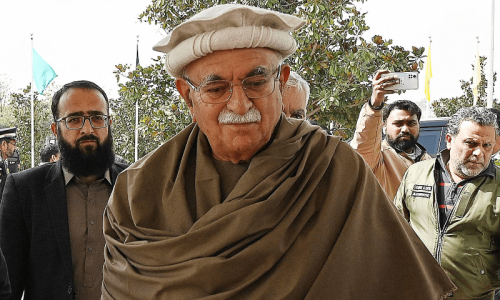APRIL 29, 1969 was the hottest day, thus far, of the summer season. Karachiites experienced scorching weather conditions when the mercury shot up to 104 degrees Fahrenheit. There was a rise of 16 degrees in temperature because the day before the maximum temperature was recorded at 88 degrees F with 65 per cent humidity. Hot winds blew across Karachi at noon. The city’s thoroughfares and main roads saw lean traffic. Citizens, however, had some relief in the evening when a cool breeze began to blow.
As it always happens in the Sinsh capital, the heat manifests itself in several forms, one of which is that the people face shortages of basic amenities. On May 4, media reports drew the attention of the authorities towards something similar. According to them, Karachi’s chronic water crisis had begun to take its toll on the citizens. It’s either a long tiring wait in a queue at the community taps for the elders or a trudging walk homewards with water-filled cans for the children. Whether it was at posh bungalows in PECHS or the many community taps feeding the huts on the roadside along Manghopir Road, water pressure registered a fall typical to summer time due to an increase in water consumption. The worst affected by the crisis were the host of colonies of displaced persons, mostly along the Hub River on Manghopir Road. The fall in water pressure also had an adverse impact on pockets in Nazimabad and Liaquatabad, which were fed by the taps –– on average, 50 persons had to wait for their turn to get water.
Amid all of this, the Karachi Metropolitan’s (KMC) anti-encroachment drive kept its momentum. On May 3, the corporation removed 100 hawkers with makeshift shops from either side of Sommerset Street in Saddar and Bohri Bazar. The main shopping centre in the area looked almost unrecognisably clean.
In times when things, not necessarily good, are taking place at breakneck speed, a pep talk by someone wise works wonders. On April 30, Raja Sahib of Mahmoodabad, who was at the time heading London’s Islamic Centre, delivered an important message at the Karachi Press Club, where a reception in his honour was held. He said: “What we have lost in Pakistan are the values that moved us to bring it [country] into being. Restoration of those values is the need of the time.” In his informal chat with journalists, the veteran statesman who was in the news lately because of his “meetings” with people of significance, expressed regret at the lowering of values that had plunged the nation into an abyss. Raja Sahib commented that politics in the period of freedom struggle was guided by what one could give. But now it had become “a game of deception” wherein the players were only concerned about what they could gain from it. He, however, steered clear of all attempts by inquisitive pen-pushers at obtaining his comments on his recent meetings with politicians and the president of the country, General Agha Mohammad Yahya Khan.
From politics to art which in Karachi is always a seamless transformation. On May 1, a bunch of theatre lovers called The New Theatre Group of Karachi presented Barefoot in the Park, a three-act comedy by Neil Simon, at the Karachi Grammar School. The play tells the story of a newly married couple, Paul and Corie, and the humorous episodes that follow when they move into a single-room apartment atop five flights of stairs after a six-day honeymoon. They young couple discover their unusual neighbour Victor-Velasco living in the attic; Corie finds him interesting for her mother, Ethel. In trying to pair the two off, the young couple gets into a quarrel and Corie has a change of heart. Well-enacted by all, especially Cynthia Larre as Corie and Jim Sutton as Velasco, Barefoot in the Park held the audience’s attention from beginning to end. It was put up in aid of the President’s East Pakistan Relief Fund.
Published in Dawn, April 29th, 2019














































Dear visitor, the comments section is undergoing an overhaul and will return soon.